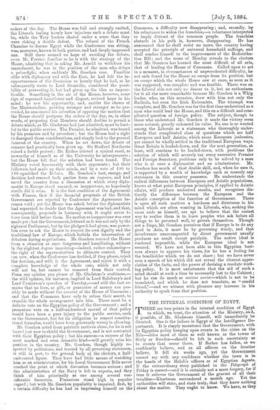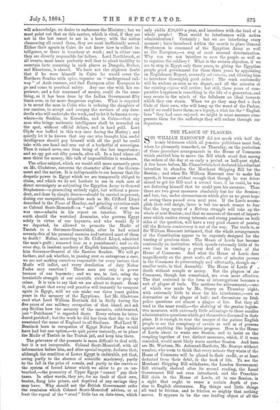THE INTERNAL CONDITION OF EGYPT.
THERE are two points in the internal condition of Egypt to which, we trust, the attention of the Ministry, and, if possible, of Mr. Gladstone himself, will immediately be directed. One is the failure in Egypt of the Intelligence De- partment. It is simply monstrous that the Government, with its Egyptian policy hanging upon events in the cities on the Nile—cities most of them as well known as the towns of Sicily or Sweden—should be left in such uncertainty as to events that occur there. If Berber has fallen, as we confidently believe, and as all officers on the frontier believe, it fell six weeks ago, yet the Government cannot say with any confidence whether the town is in the hands of the Mandi's officers or of Egyptian Agents.. If the extraordinary story published in the Telegraph of Friday is correct—and it is certainly not a mere forgery, for if trae it relieves the Government of the gravest of all their troubles—Khartoum surrendered a month ago. Yet the authorities will state, and state truly, that they know nothing• about the matter. They ought to know. We have, as they
will acknowledge, no desire to embarrass the Ministry ; but we Intuit point out that on this matter, which is vital, if they are not in the last resort to act in a hurry, with the nation clamouring all round them, they are most inefficiently served. Either their agents in Cairo do not know how to collect in- telligence, or there is treachery at work ; and in either case they are directly responsible for failure. Lord Northbrook, at all events, must know perfectly well that to plead inability to ascertain facts occurring in such places as Dongola, Berber, and Khartoum, is absurd. We have not the slightest doubt that if he were himself in Cairo he would cover the Northern Soudan with spies, organise an " underground rail- way " of Arab runners, and find European after European to go and come in practical safety. Any one else with his ex- perience, and a fair command of money, could do the same thing, as it has been done by the Indian Government fifty times over, in far more dangerous regions. What is required is to arrest the man in Cairo who is ordering the slaughter of our carriers, to accept and overpay the services of any dare- devils who will undertake the work, and to let it be known every- where—in Suakim, in Kdroshko, and in Cairo—that any man who brings authentic intelligence shall be rewarded on the spot, without official delays, and in hard gold. Lord Clyde was baffled in this way once during the Mutiny ; and quietly let it be known that any one who brought him useful intelligence should pay himself with all the gold he could take with one hand and arm out of a bucketful of sovereigns. Then it rained news, one item being of the last importance ; and no spy got out fifty pounds, after all. In a land where all men thirst for money, this talk of impossibilities is weakness.
The other subject, which we would still more earnestly press on Mr. Gladstone, concerns the character alike of the Govern- ment and the nation. It is indispensable to our honour that the despotic power in Egypt which we are temporarily obliged to claim, and which we do not hesitate to use in such acts of direct sovereignty as subjecting the Egyptian Army to General Stephenson—a proceeding entirely right, but without a prece- dent, and done by simple decree—should be exerted to prevent, during our occupation, iniquities such as Mr. Clifford Lloyd described in the Times of Monday, and grinding extortion such as Colonel Scott-Moncrieff—a " safe " official, if ever there was one—admits in his report on taxation. Why on earth should the wretched Armenian, who governs Egypt solely in virtue of our bayonets, and who would fly if we departed, be allowed to promote the Mudir of Tantah to a Governor-Generalship, after he had seized seventy-five of his personal enemies and tortured most of them to death ? Nubar, according to Mr. Clifford Lloyd, admitted the man's guilt ; removed him as a punishment ; and on the same day, in insolent mockery of English humanity, appointed him Governor-General of the Eastern Soudan. We will go farther, and ask whether, in passing over so outrageous a case, we are not making ourselves responsible for every torture that Mudir will inflict, and every dereliction of duty Nubar Pasha may sanction ? These men are only in power because of our bayonets ; and we are, in fact, using the irresistible strength of our scientific civilisation to prop up crime. It is vain to say that we are about to depart. Grant it, and grant that every evil practice will instantly be rampant again in Egypt, still we can make our three years golden years in the memory of the Egyptians. Let Mr. Gladstone read what Lord William Bentinck did in Sicily during the five years of our military occupation of that island, and ask any Sicilian how the memory of the sarcastic, cold-hearted, just "Dutchman " is regarded there. Every reform he intro- -duced perished ; but the work he did has from that day to this sweetened the name of England to all Sicilians. Had Lord W. Bentinck been in occupation of Egypt Nubar Pasha would have had but one option,—to quit power instantly, or to place the Mudir of Tantah in the Tantah jail, and keep him there.
The grievance of the peasants is more difficult to deal with, but it is not insuperable. Colonel Scott-Moncrieff, with all information before him, and after special inquiry, declares that, .although the condition of Lower Egypt is endurable, yet that, owing partly to the absence of scientific machinery, partly to the fall in the price of cereals, and partly to the corvee- the system of forced labour which we allow to go on un- touched,—the peasantry of Upper Egypt "cannot " pay their taxes. In other words, they are, for no fault of their own, beaten, flung into prison, and deprived of any savings they may have. Why should not the British Government order the remission which Colonel Scott-Moncrieff advises, or at least the repeal of the " cruel " little tax on date-trees, which only yields £30,000 a year, and interferes with the food of a whole people ? That would be interference with native administration ? Certainly ; but we are interfering every moment ; have interfered within the month to place General Stephenson in command of the Egyptian Army as well as the European,—a step of most unusual determination. Why can we not interfere to save the people as well as to organise the soldiery? What is the serious objection, if we are to stop in Egypt only three years, to giving the Egyptian people good government for those three years by appointing an Englishman Regent, avowedly ad interim, and allowing him to introduce thoroughly good order ? The work confessedly will be undone as soon as we depart, and all the miseries of the existing regime will revive ; but still, three years of com- parative happiness is something in the life of a generation, and may create in the minds of the fellaheen an ideal towards which they can strain. When we go they may find a Jack Cade of their own, who will hang up the worst of the Pashas, and if we could leave them, as a legacy, a wish for the " English laws" they had once enjoyed, we might in some measure com- pensate them for the sufferings they will endure through our departure.











































 Previous page
Previous page